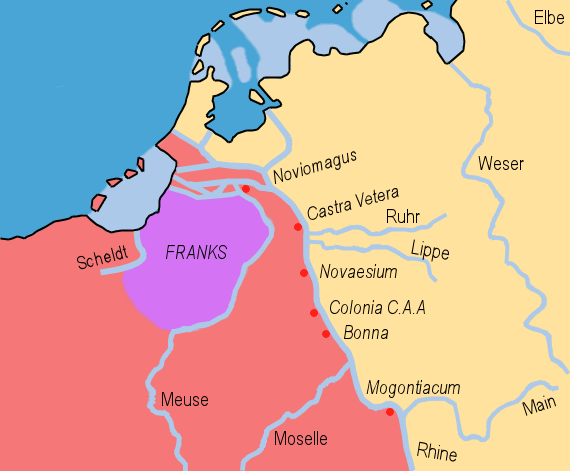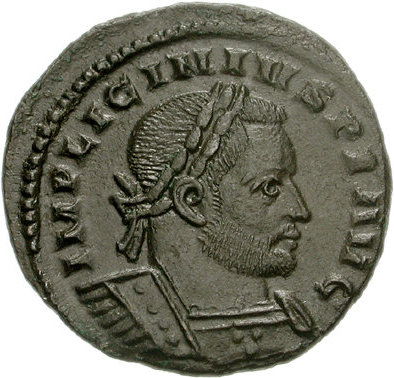|
Bonitus (magister Militum)
Bonitus was a Salian Frank of Laetic origin. He was the first ever Frank to be made magister militum, in 324. He fought beside Constantine against Licinius and was the father of the general Claudius Silvanus. Sources * Ammianus Marcellinus Ammianus Marcellinus (occasionally Anglicisation, anglicised as Ammian) (born , died 400) was a Roman soldier and historian who wrote the penultimate major historical account surviving from Ancient history, antiquity (preceding Procopius). His w ..., ''History'', XV,5,33 Frankish warriors Magistri militum 4th-century Frankish people Year of birth unknown {{AncientRome-mil-bio-stub ... [...More Info...] [...Related Items...] OR: [Wikipedia] [Google] [Baidu] |
Salian Frank
The Salian Franks, also called the Salians (Latin: ''Salii''; Greek: Σάλιοι, ''Salioi''), were a northwestern subgroup of the early Franks who appear in the historical record in the fourth and fifth centuries. They lived west of the Lower Rhine in what was then the Roman Empire and today the Netherlands and Belgium. The traditional historiography sees the Salians as one of the main divisions of the Franks alongside the Ribuarians. Recent scholarship, however, has often questioned the ethnic significance of both these terms. Etymology Various etymologies are proposed. The ethnonym is unrelated to the name for the dancing priests of Mars, who were also called Salii. In line with theories that the Salians already existed as a tribe outside the Roman Empire, the name may have derived from the name of the IJssel river, formerly called ''Hisloa'' or ''Hisla'', and in ancient times, ''Sala'', which may be the Salians' original residence. Today this area is called Salland. Alt ... [...More Info...] [...Related Items...] OR: [Wikipedia] [Google] [Baidu] |
Laeti
Laeti , the plural form of laetus , was a term used in the late Roman Empire to denote communities of ''barbari'' ("barbarians"), i.e. foreigners, or people from outside the Empire, permitted to settle on, and granted land in, imperial territory on condition that they provide recruits for the Roman military. The term ''laetus'' is of uncertain origin. It means "lucky" or "happy" in Latin but may derive from a non-Latin word. It may derive from a Germanic word meaning "serf" or "half-free colonist". Other authorities suggest the term was of Celtic or Iranian origin. Origin The ''Laeti'' may have been groups of migrants drawn from the tribes that lived beyond the Empire's borders. These had been in constant contact and intermittent warfare with the Empire since its northern borders were stabilized in the reign of Augustus in the early 1st century. In the West, these tribes were primarily Germans, living beyond the Rhine. There is no mention in the sources of ''laeti'' in the Easte ... [...More Info...] [...Related Items...] OR: [Wikipedia] [Google] [Baidu] |
Franks
The Franks ( la, Franci or ) were a group of Germanic peoples whose name was first mentioned in 3rd-century Roman sources, and associated with tribes between the Lower Rhine and the Ems River, on the edge of the Roman Empire.H. Schutz: Tools, Weapons and Ornaments: Germanic Material Culture in Pre-Carolingian Central Europe, 400-750. BRILL, 2001, p.42. Later the term was associated with Romanization (cultural), Romanized Germanic dynasties within the collapsing Western Roman Empire, who eventually commanded the whole region between the rivers Loire and Rhine. They imposed power over many other post-Roman kingdoms and Germanic peoples. Beginning with Charlemagne in 800, Frankish rulers were given recognition by the Catholic Church as successors to the old rulers of the Western Roman Empire. Although the Frankish name does not appear until the 3rd century, at least some of the original Frankish tribes had long been known to the Romans under their own names, both as allies providi ... [...More Info...] [...Related Items...] OR: [Wikipedia] [Google] [Baidu] |
Magister Militum
(Latin for "master of soldiers", plural ) was a top-level military command used in the later Roman Empire, dating from the reign of Constantine the Great. The term referred to the senior military officer (equivalent to a war theatre commander, the emperor remaining the supreme commander) of the empire. In Greek sources, the term is translated either as ''strategos'' or as '' stratelates''. Establishment and development of the command The title of ''magister militum'' was created in the 4th century, when the emperor Constantine the Great deprived the praetorian prefects of their military functions. Initially two posts were created, one as head of the infantry, as the ''magister peditum'' ("master of foot"), and one for the more prestigious cavalry, the ''magister equitum'' ("master of horse"). The latter title had existed since republican times, as the second-in-command to a Roman ''dictator''. Under Constantine's successors, the title was also established at a territoria ... [...More Info...] [...Related Items...] OR: [Wikipedia] [Google] [Baidu] |
Constantine I
Constantine I ( , ; la, Flavius Valerius Constantinus, ; ; 27 February 22 May 337), also known as Constantine the Great, was Roman emperor from AD 306 to 337, the first one to convert to Christianity. Born in Naissus, Dacia Mediterranea (now Niš, Serbia), he was the son of Flavius Constantius, a Roman army officer of Illyrian origin who had been one of the four rulers of the Tetrarchy. His mother, Helena, was a Greek Christian of low birth. Later canonized as a saint, she is traditionally attributed with the conversion of her son. Constantine served with distinction under the Roman emperors Diocletian and Galerius. He began his career by campaigning in the eastern provinces (against the Persians) before being recalled in the west (in AD 305) to fight alongside his father in Britain. After his father's death in 306, Constantine became emperor. He was acclaimed by his army at Eboracum ( York, England), and eventually emerged victorious in the civil wars against ... [...More Info...] [...Related Items...] OR: [Wikipedia] [Google] [Baidu] |
Licinius
Valerius Licinianus Licinius (c. 265 – 325) was Roman emperor from 308 to 324. For most of his reign he was the colleague and rival of Constantine I, with whom he co-authored the Edict of Milan, AD 313, that granted official toleration to Christians in the Roman Empire. He was finally defeated at the Battle of Chrysopolis (AD 324), and was later executed on the orders of Constantine I. Early reign Born to a Dacian peasant family in Moesia Superior, Licinius accompanied his close childhood friend, the future emperor Galerius, on the Persian expedition in 298. He was trusted enough by Galerius that in 307 he was sent as an envoy to Maxentius in Italy to attempt to reach some agreement about the latter's illegitimate political position. Galerius then trusted the eastern provinces to Licinius when he went to deal with Maxentius personally after the death of Severus II. Upon his return to the east Galerius elevated Licinius to the rank of ''Augustus'' in the West on 11 Nov ... [...More Info...] [...Related Items...] OR: [Wikipedia] [Google] [Baidu] |
Claudius Silvanus
Silvanus (died 7 September 355) was a Roman general of Frankish descent, usurper in Gaul against Emperor Constantius II for 28 days in AD 355. Origin and career Silvanus was born in Gaul, the son of Bonitus, a Laetic Frankish general who had supported Constantine I in the civil war against Licinius. Like so many other Franks of his times, and like his father before him, he was a loyal and thoroughly romanized "barbarian" in the military service of the Empire. By AD 351, he held the rank of tribune and was one of the senior officers who defected to Emperor Constantius II at the Battle of Mursa Major, after initially supporting the usurper Magnentius. An able soldier, Silvanus was eventually promoted to the rank of ''magister peditum per Gallias'', a crucial post, then in AD 352–353, Constantius personally entrusted him with the difficult task of driving the Alamanni tribesmen raiding and looting in Gaul back beyond the Rhine, and restoring the fast eroding Roman au ... [...More Info...] [...Related Items...] OR: [Wikipedia] [Google] [Baidu] |
Ammianus Marcellinus
Ammianus Marcellinus (occasionally anglicised as Ammian) (born , died 400) was a Roman soldier and historian who wrote the penultimate major historical account surviving from antiquity (preceding Procopius). His work, known as the ''Res Gestae'', chronicled in Latin the history of Rome from the accession of the Emperor Nerva in 96 to the death of Valens at the Battle of Adrianople in 378, although only the sections covering the period 353 to 378 survive. Biography Ammianus was born in the East Mediterranean, possibly in Syria or Phoenicia, around 330. His native language is unknown but he likely knew Greek as well as Latin. The surviving books of his history cover the years 353 to 378. Ammianus served as an officer in the army of the emperors Constantius II and Julian. He served in Gaul (Julian) and in the east (twice for Constantius, once under Julian). He professes to have been "a former soldier and a Greek" (''miles quondam et graecus''), and his enrollment among the elite ... [...More Info...] [...Related Items...] OR: [Wikipedia] [Google] [Baidu] |
Frankish Warriors
Frankish may refer to: * Franks, a Germanic tribe and their culture ** Frankish language or its modern descendants, Franconian languages * Francia, a post-Roman state in France and Germany * East Francia, the successor state to Francia in Germany * West Francia, the successor state to Francia in France * Crusaders * Levantines (Latin Christians) See also * Name of the Franks The name of the Franks (Latin ''Franci''), alongside the derived names of '' Francia'' and '' Franconia'' (and the adjectives ''Frankish'' and ''Franconian''), are derived from the name given to a Germanic tribal confederation which emerged in t ... * Franks (other) * Franconian (other) {{disambiguation Language and nationality disambiguation pages ... [...More Info...] [...Related Items...] OR: [Wikipedia] [Google] [Baidu] |
Magistri Militum
(Latin for "master of soldiers", plural ) was a top-level military command used in the later Roman Empire, dating from the reign of Constantine the Great. The term referred to the senior military officer (equivalent to a war theatre commander, the emperor remaining the supreme commander) of the empire. In Greek sources, the term is translated either as ''strategos'' or as '' stratelates''. Establishment and development of the command The title of ''magister militum'' was created in the 4th century, when the emperor Constantine the Great deprived the praetorian prefects of their military functions. Initially two posts were created, one as head of the infantry, as the ''magister peditum'' ("master of foot"), and one for the more prestigious cavalry, the ''magister equitum'' ("master of horse"). The latter title had existed since republican times, as the second-in-command to a Roman ''dictator''. Under Constantine's successors, the title was also established at a territorial ... [...More Info...] [...Related Items...] OR: [Wikipedia] [Google] [Baidu] |
4th-century Frankish People
The 4th century (per the Julian calendar and Anno Domini/Common era) was the time period which lasted from 301 ( CCCI) through 400 ( CD). In the West, the early part of the century was shaped by Constantine the Great, who became the first Roman emperor to adopt Christianity. Gaining sole reign of the empire, he is also noted for re-establishing a single imperial capital, choosing the site of ancient Byzantium in 330 (over the current capitals, which had effectively been changed by Diocletian's reforms to Milan in the West, and Nicomedeia in the East) to build the city soon called Nova Roma (New Rome); it was later renamed Constantinople in his honor. The last emperor to control both the eastern and western halves of the empire was Theodosius I. As the century progressed after his death, it became increasingly apparent that the empire had changed in many ways since the time of Augustus. The two emperor system originally established by Diocletian in the previous century fell in ... [...More Info...] [...Related Items...] OR: [Wikipedia] [Google] [Baidu] |



.jpg)
